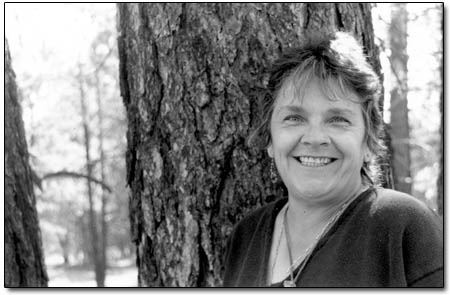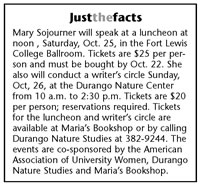|
Writer and activist Mary Sojourner
to pay a visit to Durango
by Amy Maestas
 |
| Writer and environmental
activist Mary Sojourner will be in Durango this weekend
to address a luncheon and conduct a writer’s
workshop./Courtesy photo. |
Mary Sojourner refuses to fly. Although
flying is faster and sometimes cheaper, Sojourner insists
on traveling by train. But it is not because she’s
an aviophobe. Instead, she can’t stomach how much
flying disconnects her from the earth.
A Flagstaff, Ariz., writer and environmental activist,
Sojourner’s quirk truly characterizers her deep
connection to the land, which is the central theme of
her work. Without the land, her existence – and
influence – in the West would be tentative at best.
That Sojourner landed in the West by default deepens
that relationship and raises the value of her presence.
Growing up in the small farming town of Irondequoit, N.Y.,
Sojourner – a name she took in 1972 because of her
admiration for women’s  suffragist
Sojourner Truth – had an early yet different relationship
with nature. When her parents set her off alone in a canoe
on an Adirondack mountain lake, Sojourner found respite
from a sometimes bleak childhood. Her mother, she writes
in an essay titled “First Meeting,” suffered
severe depression, undergoing stints in psychiatric hospitals
and shock treatment. As Sojourner says, it was a distressing
disease to have in the 1940s and 1950s because people
were diagnosed as “hysterical, narcissistic, manipulative.”
Her mother survived every suicide attempt. suffragist
Sojourner Truth – had an early yet different relationship
with nature. When her parents set her off alone in a canoe
on an Adirondack mountain lake, Sojourner found respite
from a sometimes bleak childhood. Her mother, she writes
in an essay titled “First Meeting,” suffered
severe depression, undergoing stints in psychiatric hospitals
and shock treatment. As Sojourner says, it was a distressing
disease to have in the 1940s and 1950s because people
were diagnosed as “hysterical, narcissistic, manipulative.”
Her mother survived every suicide attempt.
So, when she paddled away, under the aurora borealis,
Sojourner sowed the seeds of her connection with nature.
The scene meshed with her passion for cowboy movies. Only
nearly 40 years later did she recognize how powerfully
these experiences shaped her life.
Red rock amusement
In her early adult life, Sojourner reared three of her
four children alone in Rochester, N.Y. It is a city so
dreary, Sojourner explains, that it intensified her own
depression. She struggled to put bread on the table while
working on women’s mental health issues. In 1982,
a friend invited Sojourner to visit the West. She declined.
“I said, ‘No way. It’s nothing but
Disneyland with red rocks,’” she says. “At
the time I was just too rooted in East Coast urban culture.”
Sojourner eventually relented. The first stop was the
Grand Canyon. Her friend prompted her to the edge of an
overlook.
“I felt as though every cell in my body was rearranged.
That’s how powerful it was.”
She returned three years later. She was alone this time,
and purposely visited Flagstaff to seek a copy of Edward
Abbey’s Monkey Wrench Gang. She found his book –
and others – which she read while traveling on a
train home to the East Coast. After arriving, Sojourner
hastily packed her home and pointed her Pontiac Firebird
and U-Haul trailer West.
Honker SUVs
In Flagstaff, Sojourner, a short and irreverent woman
who is now 63, immediately began writing – a task
she had always wanted in life but was too busy taking
care of others to pursue. She also quickly became active
in environmental causes, which she writes about in her
novel Sisters of the Dream, a collection of short stories
called Delicate, and essays in Bonelight: Ruin and Grace
in the New Southwest. A regular contributor to High Country
News and National Public Radio, Sojourner has earned recognition
as a sharp-witted environmentalist who pens passionate
essays about the bastardization of the West’s open
spaces. Like many others, she sees developers running
roughshod over a delicate landscape that can never be
reclaimed. Golf courses and gated communities drive her
to the point of rage.
Sojourner is known for her extensive opposition to the
Canyon Mine, which a Denver-based company proposed to
open on the South Rim of the Grand Canyon to extract uranium.
She and other members of the activist group Earth First!
were arrested and jailed during one protest. Since then,
she’s devoted her efforts to defeating many more
private and public developments. As most can guess, she
endures the scourge of many developers and property-rights
owners. Like so many others in the West, she is caught
in a perpetually divisive battle among those who want
to protect the land and those who want to engulf it.
Through writing, Sojourner says she’s tried to
form a bond with people who believe differently about
the environment. It disappoints her that she has had little
success. She took advantage of her days spent working
in Flagstaff’s Aradia bookstore, where she often
interacted with tourists who were scarcely educated about
land preservation.
“I’ve tried again and again to communicate
with them,” she explains. “But they usually
just climb back in their honker SUV’s and drive
off.”
‘Apathists of the West, unite!’
Still a relative newcomer to the West, Sojourner does
not deny her own impact here. She uses her writing and
activism to awaken people to how much power they have
to minimize the marks they leave behind.
“There is no way to live anywhere without having
any impact,” Sojourner says. “I own that.
But I work hard to soften that impact.”
In fact, Sojourner goes to great lengths. She refuses
to patronize corporate retail stores. She lives in a two-room
cabin in the forest, with a wood stove but no indoor plumbing.
Is this extreme? Yes, she admits, though she doesn’t
expect everyone to live or fight like her.
In an essay titled “Apathists of the West, Unite!”,
Sojourner backs that up.
She writes: “In fact, as an American living in
the inter-mountain West, it is impossible to be purely
activist. To live in 100 percent alignment with awareness
of the devastation of the planet would be, as Stephen
Lyons has suggested, to wander quietly off, die in a nontoxic
manner and hope to feed more innocent creatures.”
Still, nary a reader escapes the essay without a mark
on his or her conscience. She doesn’t give readers
any wiggle roomto defend their actions, whether it’s
trying to explain why they paid $200 for hiking boots
or why, as she writes, they don’t long for the return
of the guillotine after watching a television ad for Range
Rovers shot against the backdrop of red rock.
If readers are guilty of either of these things –
and a slew of others she lists – they are apathists.
Apathy, she eludes, is what will kill the West. And when
you are apathetic, you are disconnected from the land.
Sojourner willingly discloses that she battles her own
demons in living a life that is incongruent with her beliefs.
For the past several years, she has battled an addiction
to gambling. While she spent hundreds of hours working
as a self-proclaimed “hardcore environmentalist,”
she spent nearly as many in a Las Vegas casino betting
up to $800 a month. The addiction was so powerful, Sojourner
nearly lost sight of her purpose.
“This summer it became clear to me that it was
going to eat my brain cells and keep me from writing,”
she admits. “It’s nice now to be congruent
with my beliefs, even though I got a lot of stories from
those experiences.”
She is now recovering in an outpatient program.
Breaking hearts
“Our very racy, technified times have seduced people
into forgetting about connection,” says Sojourner.
As a writer and teacher, she strives to reconnect people
to land – whether it’s the backcountry or
a city park. When she arrives in Durango next week, Sojourner
will conduct one of her well-known writing circles at
the Durango Nature Center to coach interested writers
in reconnecting. She believes that story is more than
just linking words; it is also about opening the senses
to natural surroundings that often get sucked into the
undercurrent of everyday living. But when people are able
to see how their stories fit into a certain place, they
are able to write about their existence with integrity.
Often, it takes drastic measures to achieve this, she
adds. That’s why her activism is so integral to
her writing. It involves consequence, which often acts
as a motivator.
“To have that connection to place it often means
we have to break peoples’ hearts and light a fire
under their asses, because only then can you let things
in and out of your heart.”
|

